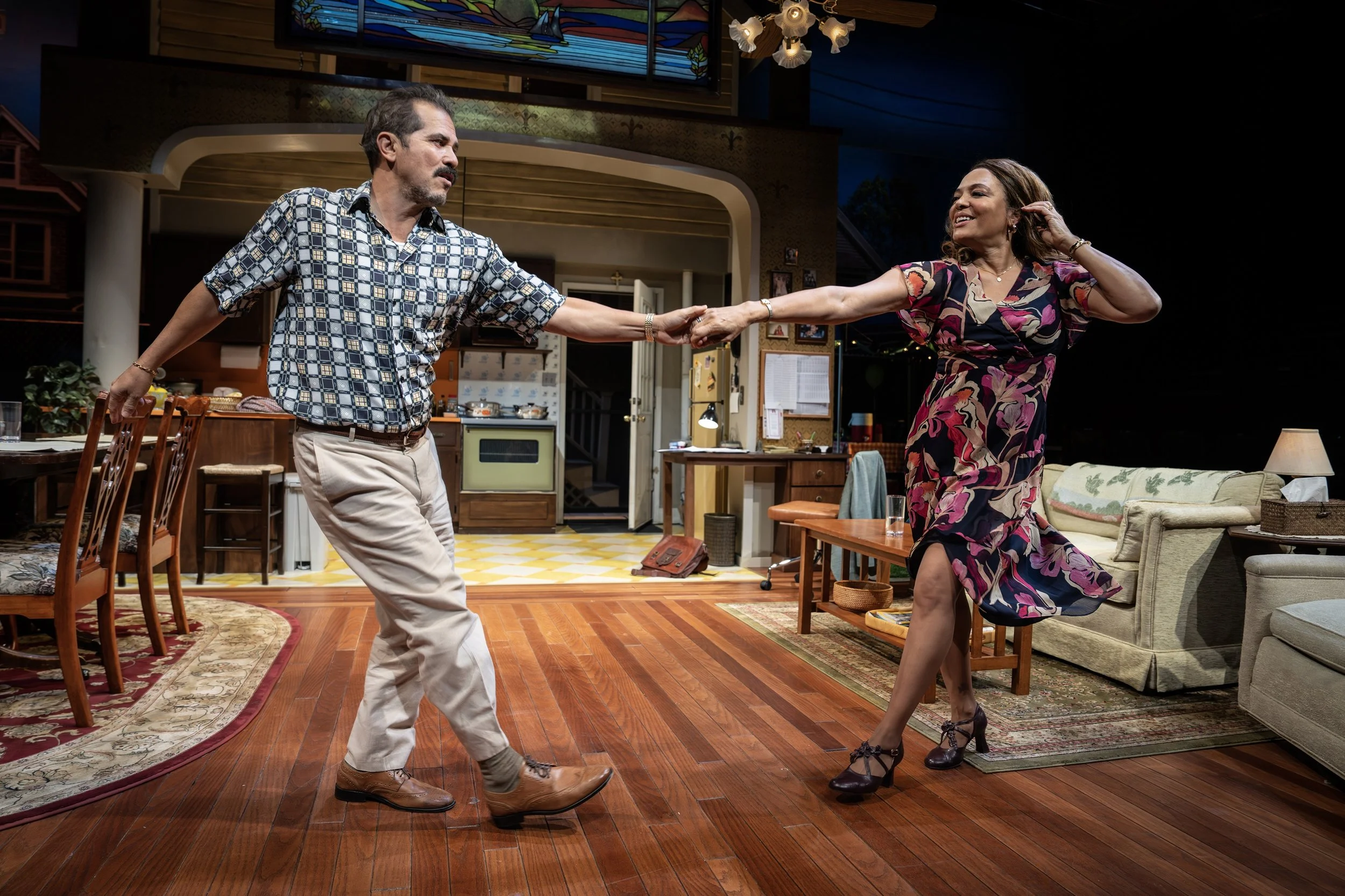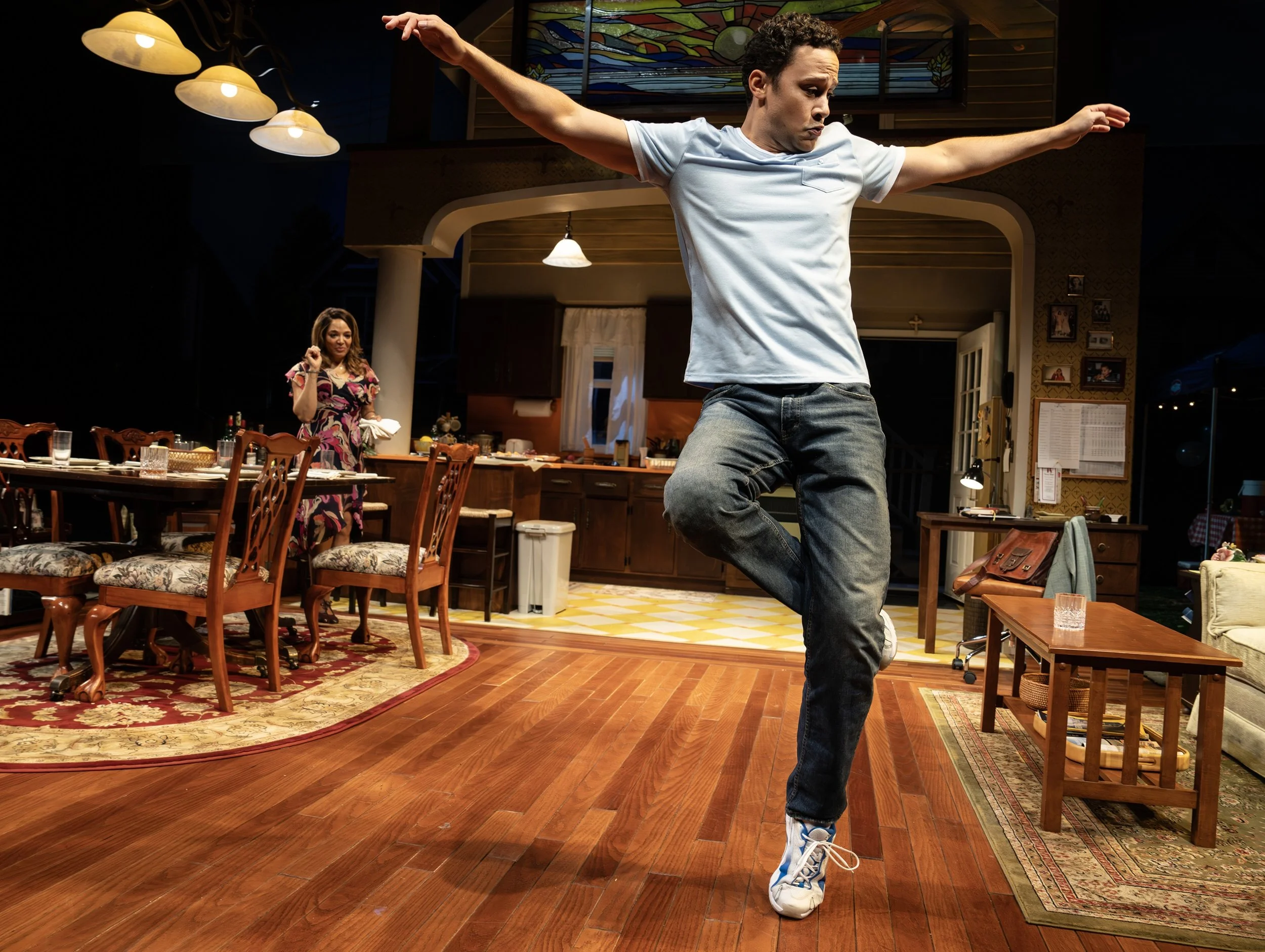“The Other Americans”: Latino Family Confronts American Trauma—at The Public
John Leguizamo and Luna Lauren Velez. Photo by Joan Marcus
John Leguizamo’s Queens’ Laundromat Story Packs Pain & Power
by David Moore
In “The Other Americans,” John Leguizamo’s dialogue pulses with the rhythms of New York life, plunging us into a home in Queens where pride, trauma, and love collide. Colombian American laundromat owner Nelson Castro, played with grit and gravitas by Leguizamo, is fighting to keep his business afloat. But Castro keeps his secrets hidden. The harder he clings, the faster the Dream slips through his fingers.
Director Ruben Santiago-Hudson steers the auction with taut pacing and an eye for intimacy. Scenes shift from the ordinary to the explosive in a heartbeat. A father-son confrontation brims with unspoken accusations, a family dinner teeters on collapse, and a backyard pool hints at tragedy. Every moment feels perilously close to implosion.
The homey set reminds me of many outer borough kitchens with sofrito on the stovetop, but the family feelings are fraught. Nelson’s son Nick, played by heartbreaking Trey Santiago-Hudson, is recovering from a vicious beating, still struggling with depression, anxiety, and PTSD. Nick is fragile and creative, dreaming of life as a choreographer. His sensitivity clashes with his father’s machismo.
Trey Santiago-Hudson
Nelson sports a familiar immigrant’s brand of machismo: Work harder and never complain! But Nelson’s stubbornness runs headlong into Nick’s vulnerability and openness. When Nelson represses, Nick reveals. When Nelson hides his pain, Nick insists on naming it.
The result does not heal but promotes the clash of two Americas under one roof: the macho Colombian patriarch’s old-fashioned ideas versus the U.S. son’s embrace of therapy and self-examination.
As Nelson, Leguizamo depicts his survival through pride and perseverance. When the Castro family tries to dance away their differences to a Tito Puente CD, conflict and lies spoil the fiesta.
Nelson’s sister Norma (commanding Rosa Evangelina Arredondo) rejects her brother’s excuses. As Nick’s tía, she lives in the chaos. She is weary, incisive, and unwilling to indulge in Nelson’s self-delusion and lies. Norma sees through her brother’s excuses when the rest of the family cannot. Powerful and decisive, Norma offers a surprising escape from the Queens laundry.
Rosa Evangelina Arredondo and John Leguizamo
Proudly, Nelson built his chain of laundromats from four to twenty. But the Castros are shackled to their business and to their abusive, exploitive father. Selling his laundromats to an unscrupulous developer might free him, but would also mean surrendering his dreams. A crucial decision looms.
For all the talk of “otherness,” the Castros never feel foreign. They don’t seem like “other Americans” at all, just Americans. Their struggles with pride, family expectations, mental trauma, and the elusive dream of “making it” are recognizable in any zip code. Love and pride dance with debt and desperation.
Leguizamo leaves us wrestling with the question: “How do families survive the ongoing weight of injustice?” In “The Other Americans,” he makes that struggle gripping, funny, and painfully real.
John Leguizamo
“The Other Americans” by John Leguizamo, directed by Ruben Santiago-Hudson, scenic design by Arnulfo Maldonado, costumes by Kara Harmon, lighting by Jen Schriever, at The Public Theater, New York.
Info: publictheater.org - to October 26, 2025.
Cast: John Leguizamo, Trey Santiago-Hudson, Rosa Evangelina Arredondo, Luna Lauren Velez, Rebecca Jimenez, Bradley James Tejada, and Sarah Nina Hayon.




